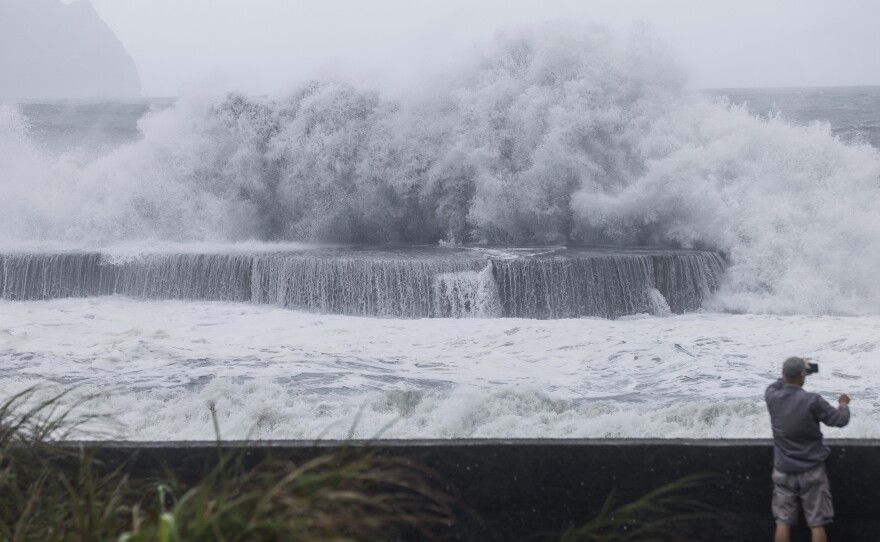Updated September 3, 2023 at 2:17 PM ET
BEIJING — Much of southern Taiwan came to a standstill Sunday as Typhoon Haikui churned over towns and farmland. Residents were urged to stay home and flights, rail transport, ferry services, classes and outdoor events were suspended, but there were no reports of injuries or serious damage.
The storm made landfall in Taitung county on the Pacific-facing east coast around 3 p.m. Sunday, bringing sustained winds of 96 mph and gusts of 120 mph.
The winds and driving rains forced in unsecured doors, uprooted trees — at least one of which crushed a parked minivan — and caused flooding in some low-lying areas.
By Sunday evening, almost 4,000 people had been evacuated from mountain communities that are at high risk of landslides and flooding, according to the Interior Ministry. Families brought sleeping mats and other necessities to school gymnasiums and public meeting halls, where they were provided with food and drink.
About 75,000 homes temporarily lost power in Taitung and Hualien counties along the east coast, and a guesthouse collapsed on Green Island just off the coast, but no injuries were reported.
There appeared to be little serious damage, and some shops remained open, partly to dispose of locally grown fruits and vegetables that would otherwise go to waste.
Among events canceled in Taiwan were a hot air balloon festival in the central Taichung region, several outdoor concerts, art events and a baseball game. National parks and treacherous roads in the island's mountainous center were also closed.
Haikui is expected to continue toward China after crossing over Taiwan, and authorities in the Chinese city of Shantou in Guangdong province were advising residents to take precautions.
Haikui arrived as Typhoon Saola continued to weaken while swirling along the Chinese coast, where 900,000 people and 80,000 fishing vessels had been moved to safety. Most of Hong Kong and parts of the coastal mainland had suspended business, transport and classes.
Damage appeared to be minimal, however, and restrictions had largely been lifted by Sunday. On Saturday night, the Hong Kong Observatory had canceled all warnings.
Because of Typhoon Saola, workers in a number of Chinese cities stayed at home and students saw the start of their school year postponed from Friday to Monday. Trading on Hong Kong's stock market was suspended and hundreds of people were stranded at the airport after about 460 flights were canceled in the key regional business and travel hub.
The cross-border bridge connecting Hong Kong, the gambling hub of Macao and manufacturing center of Zhuhai was closed at one point, with Macao leader Ho Iat Seng ordering a halt to casino operations.
In recent months, China has experienced some of its heaviest rains and deadliest flooding in years. Dozens of people have been killed, including in outlying mountainous parts of the capital, Beijing.
Despite the twin storms, China's military continued to conduct operations meant to intimidate Taiwan, a self-ruled democracy that Beijing seeks to bring under Chinese sovereignty by force if necessary.
Taiwan's Defense Ministry said it was monitoring the movements of Chinese military aircraft and navy ships near the island. However, it said there were no indications any had crossed the median line in the Taiwan Strait or entered Taiwan's air defense identification zone as they frequently do.
Copyright 2023 NPR. To see more, visit https://www.npr.org. 9(MDAzMjM2NDYzMDEyMzc1Njk5NjAxNzY3OQ001))






